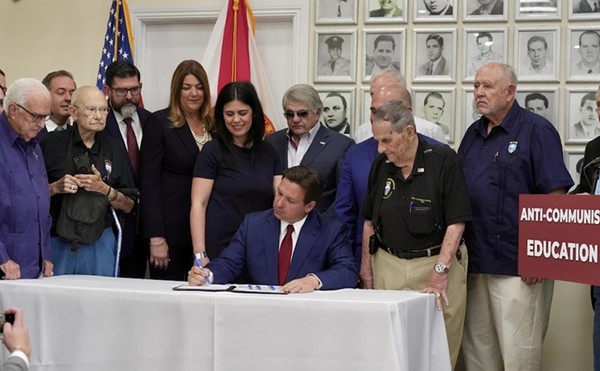Quickly now: Where do foster kids in Florida go when they turn 18 if they haven’t been adopted, reunited with their parents or otherwise permanently placed? That’s not a question most people have probably considered before. And the answer is not very encouraging. For a long time, it has simply been: to the street.
But Florida, in a surprisingly progressive move, is trying to change that. In May 2013, Gov. Rick Scott visited Valencia College in Orlando to sign a new bill into law that makes it possible for foster kids to stay in foster care longer. Called the Nancy C. Detert Common Sense and Compassion Independent Living Act (SB 1036/HB 1315), the bill went into effect Jan. 1, and it extends the age a child may stay in foster care from 18 to 21 (22 if the child has a disability), as long as he or she meets certain requirements.
The law improves upon another program, called the Road to Independence, which went into effect in 2002, and was designed to make the transition from foster care to independence easier for kids. Under the Road to Independence, at age 13 foster children started receiving instruction in basic life skills, like cooking and taking care of money – the kinds of tasks the system assumed they would be getting from their parents, if they were living in a traditional home environment. When kids turned 18 and became independent, the program allowed them a monthly stipend of up to $1,250 a month, as long as they were enrolled in some kind of school program. The stipend would stay with them until they turned 21 (though they could appeal to carry on the stipend until age 23).
“The results were not good,” says Gerry Glynn, chief legal counsel for Community Based Care of Central Florida, a private charity contracted with the state to administer and oversee foster care.
The education could be anything, she says, and completing a program was not a requirement. “You could be enrolled in a GED program for five years and never take the GED.”
In 2012, a state steering committee suggested that Florida follow the example set by some other states, including California, Illinois and Washington, which allowed foster families to continue caring for foster kids even after age 18. State foster care receives funding from Title IV-E of the Social Security Act, so the federal government agreed to make money available to foster parents who kept the kids even after they had technically aged out of the program – so any funding incentives for Florida foster families to participate in a similar program would require the state to accept more federal money. Most everyone in Florida knows that Gov. Scott has never been a fan of that, but advocates for youth pushed hard to get the issue attention in Tallahassee – and to assure that the governor didn’t just cut funding for the Road to Independence program.
Enter Florida Youth SHINE, an advocacy organization made up of former foster youth. “Once [the Legislature] started seeing the figures, that the [Road to Independence] program wasn’t working, they were thinking about cutting all the funding, period,” says Daniel Pettus, state chair for Florida Youth SHINE “We went back and forth with the legislation, trying to not get the funding cut.”
Pettus says Florida Youth SHINE “hit just about every legislator in Tallahassee,” telling their stories and trying to show that “this wasn’t about giving people money.” The effort was a success, he says, and the organization got 40 legislators to sign on as sponsors for the new bill, which allows foster kids to stay in foster care as long as they obtain a high school diploma or GED and enroll in continuing education (including vocational or technical schools). If they do strike out on their own, the bill permits them to return to foster care if they needed to.
Foster parents are now expected to help their foster children learn life skills previously taught by state-paid independent living coordinators – the people who kept an eye on foster kids who’d aged out of the system and were learning to live on their own. If parents need training to learn how to teach those skills, the state will provide it. As a result, the bill eliminates the position of independent living coordinators. Instead, it allows case managers assigned to foster kids to continue working with them until they’ve transitioned to independent living.
To pay for all this (additional case manager responsibilities, longer foster care, parent training), the new bill suggests … well, there’s the rub. In order to get Scott’s approval, the bill had to divorce itself from requiring the state to accept any new federal money, which basically leaves it with a lot of unfunded commandments.
How much is unfunded? Well, that depends on who you ask. An analysis by the Senate Appropriations Committee says extra costs in the first year would come to $404,671 – a figure that Gerry Glynn calls “ridiculously low.”
An independent study from nonprofit research group The Finance Project suggests costs could be as high as $13 million in the first year.
Nancy Detert, the Venice Republican senator whose name the bill bears, spoke to CBS Miami late last year in its defense: “If they’re waving the red flag and saying the sky is falling, why didn’t they say this last year?” she asked. Sen. Detert’s office did not return repeated requests for an interview for this story.
Florida Coalition for Children, which advocates for state community-based care agencies and child welfare organizations, did its own study, and also found the bill short on funding: “The extension of independent living was something that the Florida Coalition for Children and its members supported,” says Kurt Kelly, FCC’s CEO, via email. “However, we expressed our concerns to the Department of Children and Families regarding the policy not being revenue neutral and asked for additional time for review and implementation.”
Still, Kelly says, the Florida Coalition for Children supports the new law. “We continue to have concerns about the additional financial burden this could create within the system,” he says, “but we’re confident that working with the Legislature we can find the resources to fund this good policy.”
The consensus is that the provision will lead to better outcomes for children. “It’s a good law,” says Glynn. “Everyone is for the law.”
It’s just that not everyone is sure how it’s going to be paid for. But, as Pettus says, it’s not something that can be swept aside or ignored. Kids, he points out, are a very vulnerable population. “The problem is kids are not equipped to handle the world at 18.”
Number of young people 18-22 who aged out of foster care in Florida and said they had a high school diploma or GED: 1,011
Number who said they did not: 793
Number who said they had held a paying job within the past year: 581
Number who said they did not: 1,162
Source: Spring 2014 survey conducted by state Department of Children and Families



















